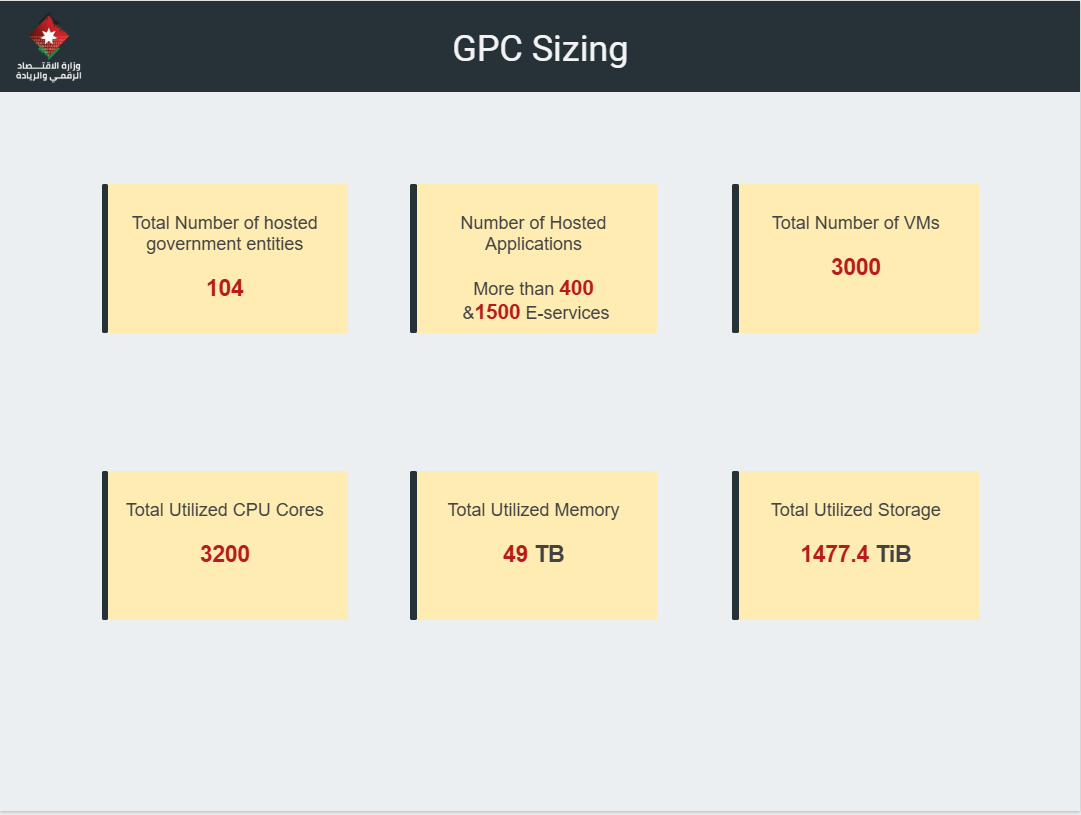Government Private Cloud Sizing

e-Government (SMART) program embodies the interest of the Kingdom of Jordan to apply the concept of e-Government. The program comes within the development initiatives and projects adopted by the Kingdom to achieve sustainable development in all aspects of life.
Vision
"An essential and active participant in the economic and social development through the use of information and communication technology to enable easy access to government information and services for all Users regardless of their geographic location or economic status or professional capacity "
Mission
e-Government (SMART) Mission is to manage change in the government and focus on the satisfaction of the recipients of government service, and achieving this through various channels to deliver the service using modern technology, knowledge management, recruitment experienced and qualified staff to implement e-Government program and initiatives to be easy and acceptable to citizens in Jordan. The e-Government (SMART) program contributes effectively to develop and administrate transformation of the Government of Jordan.
To achieve this Mission, e-Government (SMART) program depends on the application of the following themes:
- Define and develop the structure of adequate legislative and regulatory environment.
- Define and develop appropriate technological infrastructure.
- Applications related to electronic services.
- Change management and restructuring of government institutions.
- Transformation and development in the field of education, training and knowledge transfer.
- Effective Process re-engineering to achieve high efficiency.
e-Government Program Objectives
Kingdom attaches great importance to the transformation of e-Government due to the benefits e-Government (SMART) provides to the national economy, His Majesty King Abdullah II was the first who gave attention to the importance of e-Government program in 2001 announcing the Initiative and assigned the Ministry of Communications and information technology implementation.
|
e-Government Program Objectives
- Improve service delivery.
- Raise the productivity and efficiency of public sector.
- Provide better services to individuals and business.
- Increase ROI.
- Provide the required information with high accuracy in a timely manner.
- Development of skills and achievement.
- The provision of infrastructure and-technology needed to provide e-services Increase the level of security of information.
|
 Where the program works to strengthen the provision of services electronically by using the means of communication and various technology and work as a focal point to coordinate the efforts of various ministries and institutions and to develop plans for providing government services and transactions electronically, and standards and provide the necessary expertise. Where the program works to strengthen the provision of services electronically by using the means of communication and various technology and work as a focal point to coordinate the efforts of various ministries and institutions and to develop plans for providing government services and transactions electronically, and standards and provide the necessary expertise.
|
e-Government Program Pillars
The Program Plays a role and could be the catalyst of the application of e-governmental organizations, and reduces the central application of e-Government (SMART) as much as possible, with coordination between government departments. The program works on the following main pillars:

Business Level
|
|

ICT Infrastructure
|
|

Legal Framework
|
|

Institutional Framework
|
Based on this, the preparation of a comprehensive implementation plan to translate these cornerstones for major projects in which some have been completed and running. These projects include:
- Jordanian e-Government Portal (www.jordan.gov.jo)
- The National Contact Center For Government services (065008080).
- SMS Gateway on number (94444).
- Government Service Bus( GSB).
- Secure Government Network (SGN).
- Cloud Computing.
- Public Key Infrastructure(PKI).
- Information technology standards (E-GAF Security Standards, PM Kit, Change Kit, Quality Kit)
- Training initiatives and capacity-building which have trained more than 10000 government employees on training courses since 2003.
The program continues in implementation and completion of plans and programs to achieve e-Government (SMART) in all its stages and its applications.
e-Services
One of the main outputs of the e-Government (SMART) is working to provide electronic services to ensure easy access to government services for all beneficiaries and through multiple channels. E-services are categorized in to types:
 Shared Services: Shared Services:
They are Services which is being developed, “centrally” one time only and serve all government services. Shared services are named by “shared” for the possibility to share using this service from more than one entity. The e-Government (SMART) program has the responsibility for the development of these services.
|
 Cross Governmental Services: Cross Governmental Services:
Cross Government Services are Services which involve more than one government entity in which recipient submits the service at a governmental entity and coordination is arranged with other government entities to complete transaction and provide to the citizen. The responsibility of developing these services is shared between governmental entities and e-Government (SMART) program.An example of this type of service: The Vocational License service provided by Greater Amman Municipality, borders visas and other services.
|
 Vertical Services: Vertical Services:
Those services are provided through only one single government entity so that the service starts and ends in the same entity. Governmental Entities are responsible for developing these services, where the e-Government (SMART) program helps these institutions to define their services, provide technical assistance, coordination and follow-up with institutions to develop the electronic submission as services for all segments of society. Follow-up on vertical services are arranged through the national plan for e-Government (SMART) program.An example of this type of service: The Domain Registration (.jo) provided by National Information Technology Center (NITC), University Applications and other services.
|
To keep you updated visit  Jordan e-Government Portal
Jordan e-Government Portal